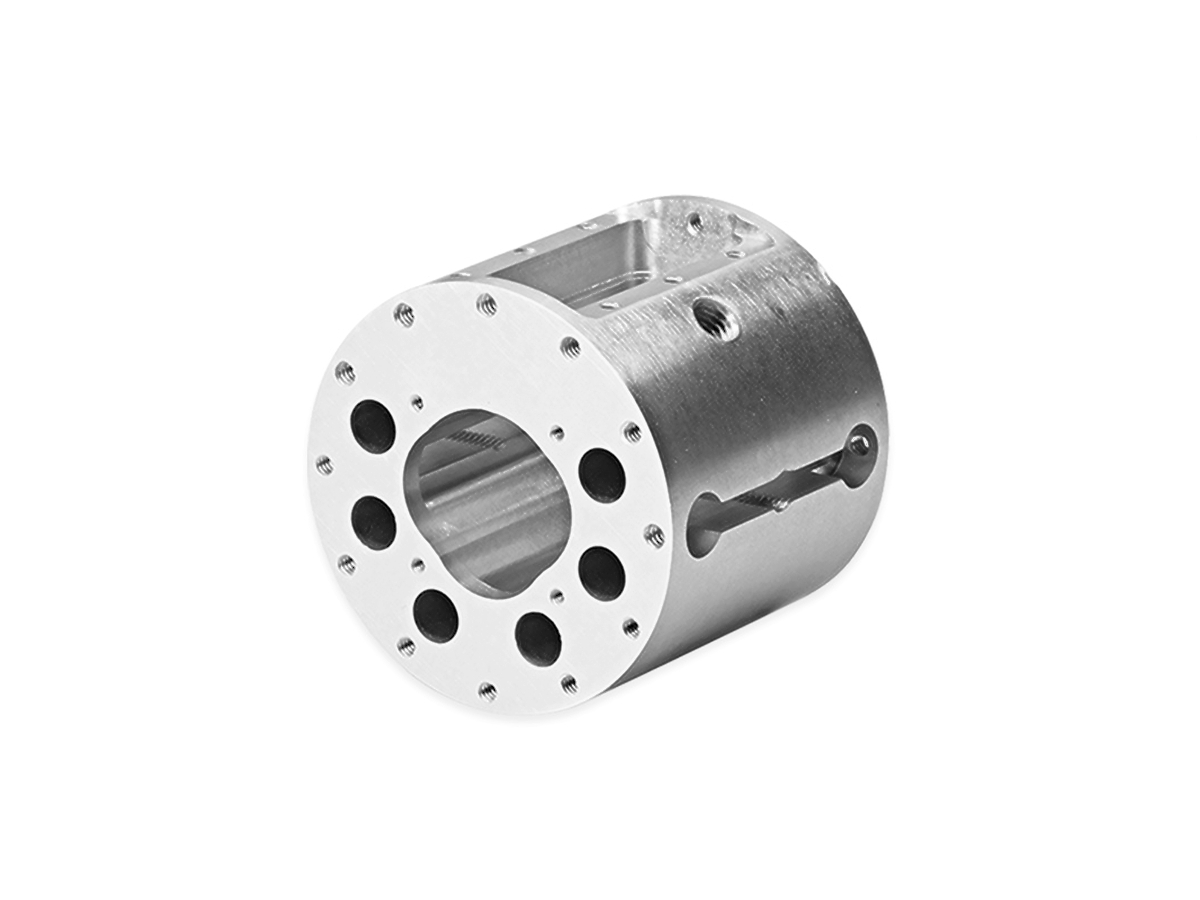Precision CNC Machined Components for Smooth Operation in Industrial Machinery
Introduction to CNC Machining for Industrial Machinery
Industrial machinery relies heavily on precision-engineered components to ensure efficient and smooth operation, minimize downtime, and optimize productivity. CNC machining, renowned for its tight dimensional tolerances (±0.005 mm) and superior surface finishes (Ra ≤0.8 μm), is ideal for manufacturing high-performance parts such as precision bearings, gears, shafts, couplings, and complex mechanical linkages essential in industrial equipment, automation, and robotics.
By leveraging advanced CNC machining services, manufacturers can achieve component accuracy, enhance equipment reliability, and significantly extend machinery lifespan, ensuring sustained performance under demanding operational conditions.
Material Comparison for Precision Industrial Components
Material Performance Comparison
Material | Tensile Strength (MPa) | Wear Resistance | Corrosion Resistance | Typical Applications | Advantage |
|---|---|---|---|---|---|
570-700 | Excellent | Moderate | Gears, shafts, couplings | High mechanical strength, good machinability | |
515-690 | Very Good | Excellent | Valve components, pump parts | Superior corrosion resistance, strength | |
360-400 | Good | Good | Bearings, bushings, fittings | Exceptional machinability, precise tolerances | |
510-540 | Good | Excellent | Lightweight structural parts | High strength-to-weight ratio |
Material Selection Strategy for Industrial Machinery Components
The selection of materials for precision industrial components involves evaluating operational demands, such as strength, corrosion resistance, wear characteristics, and machinability:
Carbon Steel 1045 is optimal for components subjected to significant mechanical stress, such as gears and shafts, offering robust strength (up to 700 MPa) and excellent wear resistance.
Stainless Steel SUS316 is chosen for applications exposed to corrosive environments, such as valve and pump components, offering exceptional corrosion resistance and high mechanical strength.
Brass C360 is ideally suited for bearings, bushings, and precision fittings due to its exceptional machinability and ability to hold precise tolerances (±0.005 mm).
Aluminum 7075-T6 provides an excellent solution for lightweight, structurally demanding parts, combining a high strength-to-weight ratio with excellent corrosion resistance.
CNC Machining Process Analysis for Industrial Machinery Components
CNC Machining Processes Performance Comparison
CNC Machining Technology | Dimensional Accuracy (mm) | Surface Roughness (Ra μm) | Typical Applications | Key Advantages |
|---|---|---|---|---|
±0.005-0.01 | 0.4-1.0 | Complex mechanical housings | High precision, complex geometry capability | |
±0.005-0.01 | 0.6-1.2 | Shafts, bearings, cylindrical parts | Efficient production, consistent accuracy | |
±0.002-0.005 | 0.05-0.2 | Sealing surfaces, precision bearings | Superior surface finish, ultra-precision | |
±0.003-0.008 | 0.2-0.8 | Complex linkages, intricate assemblies | Complex shaping, enhanced accuracy |
CNC Machining Process Selection Strategy for Industrial Components
Choosing appropriate CNC machining processes requires considering component complexity, dimensional precision, surface quality, and functional requirements:
CNC Milling is excellent for intricate mechanical housings and complex structural components, providing versatile shaping capabilities with high precision (±0.005-0.01 mm).
CNC Turning is highly efficient for producing precise cylindrical components such as shafts, bearings, and bushings, ensuring consistent dimensional accuracy (±0.005-0.01 mm).
CNC Grinding is essential for components requiring ultra-high accuracy (±0.002-0.005 mm) and exceptional surface finishes (Ra ≤0.2 μm), particularly precision bearings and sealing surfaces.
Multi-axis CNC Machining excels at manufacturing complex mechanical linkages and assemblies requiring detailed geometry and precise tolerances (±0.003-0.008 mm).
Surface Treatment Solutions for Industrial Machinery Components
Surface Treatment Performance Comparison
Treatment Method | Wear Resistance | Corrosion Resistance | Max Operating Temp (°C) | Typical Applications | Key Features |
|---|---|---|---|---|---|
Excellent (HV 1100) | Excellent (~1200 hrs ASTM B117) | 550 | Gears, shafts, bearings | High hardness, enhanced fatigue life | |
Excellent | Exceptional (~1000 hrs ASTM B117) | 400 | Precision fittings, valve parts | Uniform coating, corrosion protection | |
Good | Outstanding (~1500 hrs ASTM B117) | 300 | Aluminum structural components | Corrosion protection, durability | |
Excellent | Outstanding (~1200 hrs ASTM B117) | 450 | Bearings, shafts, fittings | Surface hardness, reduced friction |
Surface Treatment Selection Strategy for Industrial Components
Selecting suitable surface treatments improves the durability, operational life, and corrosion resistance of CNC machined components:
Nitriding significantly enhances wear resistance (up to HV 1100 hardness) and fatigue life for heavily loaded components like gears, shafts, and bearings.
Electroless Nickel Plating provides uniform coating thickness, excellent corrosion protection (~1000 hrs ASTM B117), and wear resistance ideal for precision valve components and fittings.
Anodizing effectively protects aluminum structural components against corrosion (1500 hrs ASTM B117) and improves surface durability.
Chrome Plating offers excellent hardness and corrosion protection (~1200 hrs ASTM B117), reducing friction and wear in precision bearings and fittings.
Typical Prototyping Method
CNC Machining Prototyping: Delivers prototypes with dimensional accuracy ±0.005 mm and surface finish Ra ≤0.8 μm, ideal for functional testing of critical industrial machinery components.
Material Jetting: Produces highly detailed prototypes with layer thicknesses as fine as 16-32 microns, useful for evaluating intricate designs and component interactions.
Powder Bed Fusion: Offers metal prototypes with complex geometries and high mechanical performance, achieving typical tolerances ±0.1 mm, suitable for assessing mechanical and thermal performance before full-scale production.
Quality Control Standards for Precision CNC Machined Components
Dimensional accuracy inspections using Coordinate Measuring Machines (CMM).
Surface roughness testing via precision profilometers.
Material strength and hardness verification according to ASTM and ISO standards.
Non-destructive testing (NDT) including ultrasonic and magnetic particle inspections to ensure integrity.
Corrosion resistance verification under standardized ASTM B117 salt spray testing.
Comprehensive documentation and traceability compliant with ISO 9001 quality management standards.
Industry Applications of Precision CNC Machined Components
High-performance bearings and bushings.
Precision gears, shafts, and mechanical linkages.
Valve assemblies and pump components.
Structural and housing components for automation and robotics.
Related FAQs:
Why is precision CNC machining critical for industrial machinery components?
What materials provide optimal durability for CNC machined industrial parts?
Which CNC machining processes deliver the highest precision for machinery components?
How do surface treatments extend the lifespan of industrial machinery components?
What quality standards are required for CNC machined industrial parts?

